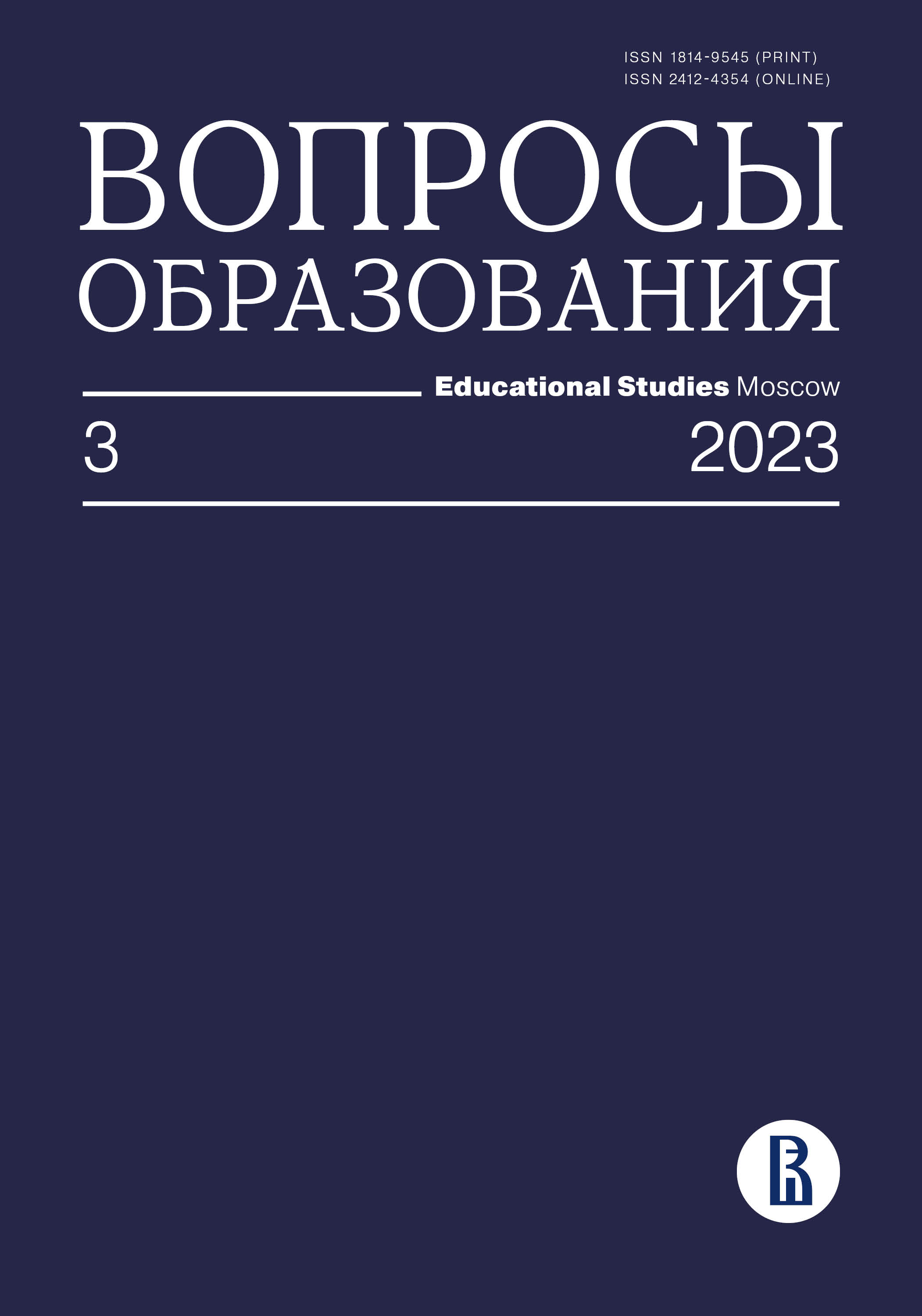Психометрические исследования: современные методы и новые возможности для образования
Аннотация
Качественные измерения — фундаментальное требование к исследовательской практике в сфере социальных наук. Качество измерений определяет валидность интерпретаций и выводов, которые мы можем сделать, решений, которые мы можем принять на основе полученных в результате измерений данных. Для качественных измерений в социальных науках необходимы инструменты оценки, а также методы анализа данных, позволяющие связать наблюдаемые результаты измерений с теоретическими атрибутами. Научную основу для их разработки дает психометрика.
Предваряя специальный выпуск журнала «Вопросы образования / Educational Studies Moscow», посвященный психометрике, приглашенные редакторы этого выпуска освещают основные вехи истории психометрики, выделяют несколько исключительно значимых публикаций, отмечают профессиональные институции и авторов, которые внесли весомый вклад в развитие данной отрасли науки. Особое внимание авторы уделяют истории психометрики в России. Оценивая возможности, перспективы и ограничения психометрики, авторы высказывают свою точку зрения на дискуссионные вопросы, и она не всегда совпадает с мнением авторов специального выпуска.
В этом выпуске представлены примеры использования современных психометрических методов для решения актуальных проблем в исследованиях образования, а также в исследованиях на стыке образования и психологии, образования и разных сфер бизнеса. Всех авторов представленных статей объединяет стремление совершенствовать исследовательскую практику в социальных науках за счет по-настоящему качественных измерений.
Скачивания
Литература
American Educational Research Association, American Psychological Association, National Council on Measurement in Education, Joint Committee on Standards for Educational and Psychological Testing (U.S.) (2014) Standards for Educational and Psychological Testing. Washington, DC: American Educational Research Association.
Avanesov V.S. (1996) Kompozitsiya testovykh zadaniy [Composition of Test Tasks]. Moscow: Association of Engineers-Teachers.
Budilova E.A., Koltsova V.A. (1985) 100-letie pervoy russkoy eksperimental´noy psikhologicheskoy laboratorii [100th Anniversary of the First Russian Experimental Psychological Laboratory]. Voprosy Psychologii, no 6, pp. 96–102.
Chelyshkova M.B. (2002) Teoriya i praktika konstruirovaniya pedagogicheskikh testov [Theory and Practice of Designing Pedagogical Tests]. Moscow: Logos.
Chelyshkova M.B. (1995) Razrabotka pedagogicheskikh testov na osnove sovremennykh matematicheskikh modeley [Development of Pedagogical Tests Based on Modern Mathematical Models]. Moscow: MISIS.
Cooper C. (2000) Individual´nye razlichiya [Individual Differences]. Moscow: Aspekt.
Embretson S.E., Reise S.P. (2000) Item Response Theory for Psychologists. Mahwah, NJ: Erlbaum.
Hambleton R.K., Swaminathan H., Rogers H.J. (1991) Fundamentals of Item Response Theory. Newbury Park, CA: Sage.
Kane M.T. (2001) Current Concerns in Validity Theory. Journal of Educational Measurement, vol. 38, no 4, pp. 319–342. http://dx.doi.org/10.1111/j.1745-3984.2001.tb01130.x
Kardanova E.Yu. (2008) Modelirovanie i parametrizatsiya testov: osnovy teorii i prilozheniya [Modeling and Parameterization of Tests: Fundamentals of Theory and Applications]. Moscow: Federal Testing Center.
Klein P. (1994) Spravochnoe rukovodstvo po konstruirovaniyu testov. Vvedenie v psikhometricheskoe proektirovanie [Reference Guide for Designing Tests. Introduction to Psychometric Design]. Kiev: PAN.
Lord F.M. (1980) Applications of Item Response Theory to Practical Testing Problems. New York, NY: Routledge. doi.org/10.4324/9780203056615
Lord F.M., Novick M.R. (1968) Statistical Theories of Mental Test Scores. Menlo Park, CA: Addison-Wesley.
Messick S. (1995) Standards of Validity and the Validity of Standards in Performance Assessment. Educational Measurement: Issues and Practice, vol. 14, no 4, pp. 5–8. https://doi.org/10.1111/j.1745-3992.1995.tb00881.x
Mislevy R.J. (2007) Validity by Design. Educational Researcher, vol. 36, no 8, pp. 463–469.
Myford C.M., Wolfe E.W. (2004) Detecting and Measuring Rater Effects Using Many-Facet Rasch Measurement: Part 2. Journal of Applied Measurement, vol. 5, no 2, pp. 189–227.
Myford C.M., Wolfe E.W. (2003) Detecting and Measuring Rater Effects Using Many-Facet Rasch Measurement: Part 1. Journal of Applied Measurement, vol. 4, no 4, pp. 386–422.
Neiman Yu.M., Khlebnikov V.A. (2000) Vvedenie v teoriyu modelirovaniya i parametrizatsii pedagogicheskikh testov [Introduction to the Theory of Modeling and Parametrization of Pedagogical Tests]. Moscow: Prometey.
Rasch G. (1960) Probabilistic Models for Some Intelligence and Attainment Tests. Copenhagen: Danmarks Paedagogiske Institut.
Sirotkina I., Smith R. (2016) Istoriya psikhologii v Rossii: kratkiy ocherk s avtorskimi aktsentami. Preprint WP6/2016/01 [History of Psychology in Russia: Short Review with the Authors’ Emphasis. Working paper no WP6/2016/01]. Moscow: HSE.
Wijsen L.D., Borsboom D., Cabaço T., Heiser W.J. (2019) An Academic Genealogy of Psychometric Society Presidents. Psychometrika, vol. 84, no 2, pp. 562–588. http://dx.doi.org/10.1007/s11336-018-09651-4
Wright B.D., Masters G.N. (1982) Rating Scale Analysis. Rasch Measurement. Chicago, IL: Mesa.
Wright B.D., Stone M.N. (1979) Best Test Design. Rasch Measurement. Chicago, IL: Mesa.








